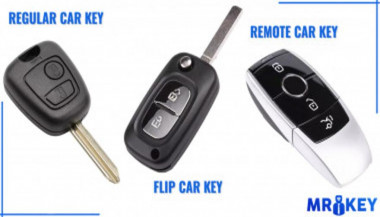Modern car keys are more than just simple tools to unlock doors—they're powerful components of your vehicle’s security system. Hidden inside many keys is a small yet crucial piece of technology known as a transponder chip.
But how can you tell if your car key has one?
Whether you’ve lost your key, are looking to replace it, or simply want to understand your vehicle better, knowing if your key contains a transponder chip is essential. This guide will explain what a transponder is, why it matters, and how you can easily check if your key is equipped with one.
What Is a Transponder Chip?
A transponder chip, short for "transmitter + responder," is a small electronic microchip embedded inside the plastic head of the car key or within a smart key fob.
When you insert the key into the ignition—or have it nearby in a push-button start system—the chip emits a unique signal. The vehicle’s onboard computer must recognize this signal before it will allow the engine to start.
Without the correct signal, even if the key physically fits into the ignition, the car won’t move. Transponders have been a game-changer in reducing car theft, and today, nearly all vehicles produced after the late 1990s are equipped with them.
Learn more about how modern keys work and find replacement options in our car keys collection.
Why It’s Critical to Know If Your Key Has a Chip
If your key has a hidden transponder chip, replacing it is more complicated than simply cutting a new metal key. You will need a key that not only matches the cut but also includes the correct programming to communicate with your car’s immobilizer system.
Failing to recognize this can lead to frustration, extra dealership fees, or even being stranded.
Moreover, understanding your key's technology helps you make smarter choices when buying a spare, upgrading your security setup, or troubleshooting ignition issues.
How to Check If Your Car Key Has a Transponder Chip
Fortunately, you don’t need expensive equipment to find out. Start by considering the age of your vehicle: if your car was manufactured after 1995 (in Europe) or 1998 (in the USA), chances are very high it uses a transponder system.
Next, examine the physical key. Keys with large, bulky plastic heads usually house a chip inside. In contrast, purely metallic keys without plastic parts tend to belong to older, non-transponder vehicles.
You can also perform a simple foil test. Wrap the head of your key in aluminum foil and try to start the car. Since foil blocks radio frequencies, if the car refuses to start, it’s likely that a transponder chip is present.
If you want absolute certainty, consult your vehicle’s manual or speak with a professional locksmith. Many locksmiths use specialized tools to detect whether a chip exists. For additional technical explanation, you can refer to this guide on how immobilizer systems work.
What Happens If the Transponder Signal Is Missing?
If you try to start your car without the proper transponder signal, the immobilizer system kicks in.
Most vehicles will either not crank at all or crank without allowing the engine to fire. Some models will display a warning light on the dashboard, often shaped like a padlock or a car with a key icon.
Without a valid transponder signal, you won't be going anywhere—no matter how new or well-cut the key is.
Can You Program a Transponder Key Yourself?
Depending on the make and model of your car, some basic keys can be programmed at home—especially if you already have one working key available.
However, many newer vehicles require professional diagnostic tools connected directly to the car’s computer to program keys securely. Attempting DIY programming on these systems without the right knowledge can lock your car’s immobilizer and lead to expensive repairs.
Always consult your car’s manual or seek professional help before attempting any programming yourself.
Knowledge = Protection
Understanding whether your car key contains a hidden transponder chip isn’t just a fun fact—it's essential for protecting your vehicle and saving yourself time, money, and hassle.
Whether you're planning to replace a worn-out key, add a backup, or upgrade your security, knowing what’s inside your key helps you make better, safer decisions.
If you ever need a spare key, a battery replacement, or advice on key maintenance, you can explore more in our online store at Mr Key.
Remember: a smart driver is a secure driver. Stay informed, stay prepared, and you'll always stay one step ahead.

_1745925835.jpg)
 (1)_1747918716.jpg)
 (1)_1736339630.jpg)

 (1)_1736340504.jpg)